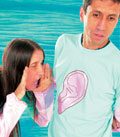 “Puff, puff, give” almost always results in conspiracy theories and a quick run to the 7-Eleven. But in the high Andes alongside an Inga tribe shaman and after numerous cups of yage, Aterciopelados became fully aware of the deeper power that lay in their electric mics and amps.
“Puff, puff, give” almost always results in conspiracy theories and a quick run to the 7-Eleven. But in the high Andes alongside an Inga tribe shaman and after numerous cups of yage, Aterciopelados became fully aware of the deeper power that lay in their electric mics and amps.
It was during that time that lead singer Andrea Echeverri and bassist Hector Buitrago found themselves learning new ways of life and “envisioning” the world in a different way. After that psychedelic episode and with four album releases to their name (Con el Corazón en la Mano 1993, El Dorado 1994, La Pipa de la Paz 1996, and Caribe Atómico 1998), the band finally anchored in on what they felt was their sole purpose as musicians.
Inspired by world music and influenced greatly by the boleros and Colombian folklore that her mother sang to her, Echeverri found herself writing songs about feminism, love for humankind, and social awareness. Together with lifelong friend and one-time companion, Buitrago, the two managed to create a force so great that it established them as pioneering artists and inspired musicians for years to come.
In Bogota, Colombia, they first stepped foot on a stage under the name “Delia y Los Aminoacidos”, a band that was heavily influenced by Buitrago’s love for punk and ska, as well as Echeverri’s lack of experience with writing and composing music. It was in 1993 that they changed their name to “Aterciopelados”, and released their first album titled Con el Corazón en la Mano which contained the singles “Mujer Gala” and “Sortilegio”. Con el Corazón en la Mano debuted when a Spanish rock scene in Colombia was zero to none. Since the rock scene was nonexisting. Because Aterciopelados’ music was far from the traditional Colombian sounds, the engineers working on the album did not give it its’ due importance. Therefore, the recording was rushed and failed to provide the musicians the liberty to experiment with the vocals and musical arrangements. Nonetheless, Aterciopelados were able to create a following and soon began to play all over Colombia.
video from:serchswitch
From 1993 to 1998, the group traveled and recorded enough to realize that mass production was not their goal as musicians. They rejected offers to record for major U.S. labels which would have compromised them to sing in English and move to the States.
In 2000, Aterciopelados returned with Gozo Poderoso produced by Buitrago himself. The album was a compilation of the elements and sounds that are found in their previous albums and it also gave the artists the independence and freedom to write, compose, and arrange their own music-something that they lacked in their first production.
Throughout their musical career, Aterciopelados contributed in various compilations such as the tribute album to Jose Alfredo Jimenez, Queen, and Soda Stereo. Amongst other soundtrack contributions, their participation in the soundtrack for the film “La Mujer de mi Hermano” with Echevirris’ song titled “Baby Blues”, reinforced the reputation that the artists had for their eclectic sound.
During their four-year hiatus, Aterciopelados were far from taking a music scene break. Both Buitraga and Echeverri released solo albums all the while collaborating in each other’s projects. Echeverris’ self-titled release produced by Buitraga granted her a Grammy nomination for Best Latin Rock/Alternative Album and a Latin Grammy nomination for Best Rock Album. In contrast to the music style that Aterciopelados was known for performing, Echeverris’ solo album contained mainly lullabies inspired by her experiences with pregnancy and motherhood. Buitragos’ solo project, Conector, was released in 2006 and had the participation of musicians such as Julieta Venegas, Alex Ubago, and Echeverri. Although his solo album did not receive the acclaim that Echeverris’ solo album received, the album was a well-organized production that was inspired by world music, rock, and spirituality.
Throughout their entire musical career, Aterciopelados received nominations for the Grammy and Latin Grammy Awards, MTV Music Awards, and Premio Lo Nuestro. Their first Latin Grammy nomination came in 1996 for the production of La Pipa de la Paz and ten years later, their release of Oye-their first album under the Nacional label- would land the band yet another Latin Grammy award for Best Alternative Album.
Check out the Al Borde exclusive interview with Aterciopelados. Do a search for the article title: Aterciopelados, 6 Años Después in our search field.

